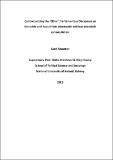| dc.description.abstract | This thesis argues that parliamentary discourses on genocide and rape have experienced continuity throughout the twentieth century. This is evident from the repetition of discursive categories within the British Houses of Parliament during the Anglo-Boer War (1899-1902) and the Bosnian War (1992-1995), despite the fact that both conflicts occurred in extremely different political and social contexts. In other words, while historical contexts have changed, certain parliamentary discourses have not. This renders these discourses impractical and inadequate in the face of the current social and political environment. In identifying this trend, this thesis argues that the 'Other', the antithesis to the norm, ensures that certain acts are not recognised as genocide or rape. This in turn means these cases cannot be grieved or redressed because they do not exist as crimes, having not conformed to norms of recognition, thus failing to reach the established 'threshold of authenticity'. Using qualitative research methods, a poststructuralist framework, and a gender frame of analysis throughout, this thesis demonstrates this discursive continuity through a comparative analysis of British parliamentary debates during both wars. Overall, this thesis examines how the parliamentary discourses of these two wars have helped establish and reinforce the construction of the 'Other' which has restricted the confines of the crimes to outside the established thresholds of authenticity'. Using qualitative research methods, a poststructuralist framework, and a gender frame of analysis throughout, this thesis demonstrates this discursive continuity through a comparative analysis of British parliamentary debates during both wars. Overall, this thesis examines how the parliamentary discourses of these two wars have helped establish and reinforce the construction of the 'Other' which has restricted the confines of the crimes to outside the established thresholds of authenticity. | en_US |


